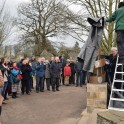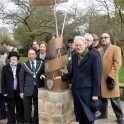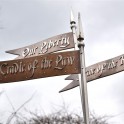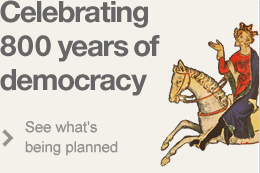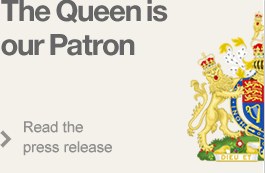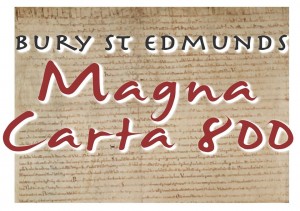 ‘Our Liberty‘, a significant and lasting memorial to Bury St Edmunds’ 800-year link to the Magna Carta was unveiled in the Abbey Gardens on 6 February 2016. The feature, entitled ‘Our Liberty’ and designed by a Suffolk artist, uses original Abbey stone, bronze and steel and follows last year’s international 800th anniversary.
‘Our Liberty‘, a significant and lasting memorial to Bury St Edmunds’ 800-year link to the Magna Carta was unveiled in the Abbey Gardens on 6 February 2016. The feature, entitled ‘Our Liberty’ and designed by a Suffolk artist, uses original Abbey stone, bronze and steel and follows last year’s international 800th anniversary.
Academic research proved that Bury St Edmunds played a more crucial role in the build-up to the sealing of the Magna Carta than previously thought. Research by Professor David Carpenter (pictured with the monument, below) for his book ‘Magna Carta’ featured new evidence: a meeting of rebellious barons not only took place in the town’s Abbey in 1214 but also that they met a month earlier than previously suggested. Professor Carpenter was the guest of honour at the Abbey Gardens event and unveiled the new feature. He also presented some of his groundbreaking research at a talk later in the day at Moyse’s Hall.
In images: ‘Our Liberty’ Unveiling:
Click on an image to expand.
- The unveiling in Bury St Edmunds
- Prof. David Carpenter unveiled the monument
Local artists were invited to submit proposals for a memorial, with the winning design submitted by Nigel Kaines of ‘Designs on Metal’, Stowlangtoft. Nigel’s ‘Our Liberty’ design shows spears and banners of the barons who met in Bury St Edmunds in 1214, with bronze scrollwork displaying shields carrying the important commemorative events. The whole design is supported on original stone from the Abbey – stones which might have been witness to the arrival of the barons all those years ago.
Margaret Charlesworth of the Magna Carta Sculpture Committee said:
“We are very grateful to Brian Ansell, a local sculptor who came up with the original idea of creating a permanent memorial in stone. Runnymede commissioned a statue of the Queen and we in Bury have this sculpture which relates wholly to key events in our chapter of the Magna Carta story. The new research and this memorial confirms the status of Bury St Edmunds as a Magna Carta town and will, I am sure, give people an extra sense of our place in history as they walk in our renowned and beautiful Abbey Gardens.”
St Edmundsbury Borough Council’s Cabinet member for Leisure and culture, Cllr Joanne Rayner, said:
“The recent confirmation that our town played such a key role in the Magna Carta story, making it literally the birthplace of democracy, is hugely significant and I am delighted that we will have a new feature in the Abbey Gardens as a further testament to the town’s fascinating history.”
Magna Carta – the Bury Connection
Bury St Edmunds’ connection with the Magna Carta is founded in Flores Historiarum (The Flowers of History), a chronicle written by Roger of Wendover (d. 1236), a monk in the Benedictine monastery of St. Albans (although not all historians accepted that account). In 1849, two plaques were erected on the ruined piers of the crossing of the Abbey Church. The plaques describe the town’s link with the Magna Carta and list the barons. The Borough’s motto, Sacrarium Regis, Cunabula Legis, (Shrine of the King, Cradle of the Law) also seems to date from about this time. In 1907, a pageant dedicated to the Magna Carta resulted from the upsurge of interest in Bury St Edmunds’ history. The borough council invited renowned Pageant Master Louis Napoleon Parker to run the event, who insisted everything used in the pageant be made in the town itself to benefit the town’s businesses and boost community spirit. Two further pageants followed in 1959 and 1970, the latter focusing on the Life and Martyrdom of St Edmund.
Featured Article
When you were kind enough to ask me to speak this evening I was Master of the Rolls and as such ex officio Chairman of the Magna Carta Trust. The Magna Carta Trust is a charitable body devoted to increasing knowledge of and...
Read on...Recent Articles
- Magna Carta's American Adventure
- 800th anniversary of Bristol...
- Bristol 800 concert and...
- Emancipation and Magna Carta
- Terrorism and Tolerance -...
- Magna Carta
- Magna Carta Benches mark...
- ABA Magna Carta Memorial...
Stay updated
If you would like to keep informed about the work of the Magna Carta Trust and our partners, please sign up to the newsletter below.
Become a Supporter
There are a number of significant supporter opportunities. Register your interest early to ensure the widest range of options.
Find out more


